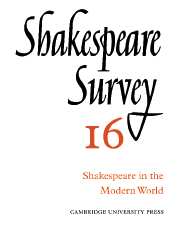Book contents
- Frontmatter
- An Obligation to Shakespeare and the Public
- Our Closeness to Shakespeare
- The Popularity of Shakespeare: An Examination of the Royal Shakespeare Theatre’s Repertory
- Shakespeare and the Fashion of These Times
- An Approach to Shakespearian Tragedy: The ‘Actor’ Image in Macbeth
- Shakespeare’s Impact Today in France
- Shakespeare and the Modern World
- Modern ‘Theatrical’ Translations of Shakespeare
- Shakespeare as ‘Corrupter of Words’
- Shakespeare in Ghana
- ‘Timon of Athens’
- Who Strutted and Bellowed?
- Shakespeare in Planché’s Extravaganzas
- ‘Our Will Shakespeare’ and Lope de Vega: An Unrecorded Contemporary Document
- Shakespeare and the Mask
- International Notes
- Shakespeare Productions in the United Kingdom: 1961
- Acting Shakespeare Today. A review of performances at the Royal Shakespeare Theatre, August 1962
- Canada’s Achievement
- 1 Critical Studies
- 2 Shakespeare’s Life, Times and Stage
- 3 Textual Studies
- Books Received
- Index
- Plate section
Canada’s Achievement
Published online by Cambridge University Press: 28 March 2007
- Frontmatter
- An Obligation to Shakespeare and the Public
- Our Closeness to Shakespeare
- The Popularity of Shakespeare: An Examination of the Royal Shakespeare Theatre’s Repertory
- Shakespeare and the Fashion of These Times
- An Approach to Shakespearian Tragedy: The ‘Actor’ Image in Macbeth
- Shakespeare’s Impact Today in France
- Shakespeare and the Modern World
- Modern ‘Theatrical’ Translations of Shakespeare
- Shakespeare as ‘Corrupter of Words’
- Shakespeare in Ghana
- ‘Timon of Athens’
- Who Strutted and Bellowed?
- Shakespeare in Planché’s Extravaganzas
- ‘Our Will Shakespeare’ and Lope de Vega: An Unrecorded Contemporary Document
- Shakespeare and the Mask
- International Notes
- Shakespeare Productions in the United Kingdom: 1961
- Acting Shakespeare Today. A review of performances at the Royal Shakespeare Theatre, August 1962
- Canada’s Achievement
- 1 Critical Studies
- 2 Shakespeare’s Life, Times and Stage
- 3 Textual Studies
- Books Received
- Index
- Plate section
Summary
Canada’s Shakespeare Festival at Stratford, Ontario, celebrated its tenth season last summer. In more sophisticated countries, where the tradition of theatre runs deeper, there would be little to crow about in a mere ten-season record. But when the first Stratford season opened in a big-top circus tent, there can have been only a few visionaries who thought that such a venture in Canada would last as long as ten years.
The first season, in the Coronation time of 1953, was dominated by three people: Sir Tyrone Guthrie, who directed Richard III and All's Well That Ends Well; Tanya Moiseiwitsch, who designed them and, with Guthrie, designed the stage too; and Alec Guinness, who played a traditional Richard Crookback and a modern-dress King of France in All's Well.
Guthrie and Moiseiwitsch still dominate the Festival—Miss Moiseiwitsch because she has designed at least one play each season, and Guthrie because no one can direct a play at Stratford without its being moulded to some degree by the exigencies of the stage which he had such a hand in designing.
The stage was not, and was not intended to be, a replica of any specific shape which Hotson or Cranford Adams or Hodges or anyone else thought the Globe might have been. It was a stage designed, as Guthrie said at the time [Shakespeare Survey 8 (1955), pp. 127-31), merely to 'offer the facilities of an Elizabethan stage'; a stage, in other words, on which a play might be mounted as it might have been in the earlier Elizabethan age.
- Type
- Chapter
- Information
- Shakespeare Survey , pp. 152 - 154Publisher: Cambridge University PressPrint publication year: 1963

